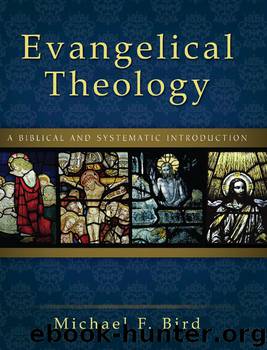Evangelical Theology: A Biblical and Systematic Introduction by Michael F. Bird

Author:Michael F. Bird [Bird, Michael F.]
Language: eng
Format: epub
Tags: Non-Fiction
ISBN: 9780310494423
Amazon: B00BW2U492
Goodreads: 18782739
Publisher: Zondervan
Published: 2013-10-29T00:00:00+00:00
4.5.3 THE OBJECTIVE GROUNDS OF SALVATION
Third, the resurrection is the objective grounds of salvation. Ordinarily folks think of the cross as the means of salvation, and resurrection is proof that the cross redeems believers from the penalty of sin. No, we are saved by, in, and through the resurrection of Jesus Christ. Consider what Paul says: “He was delivered over to death for our sins and was raised to life for our justification” (Rom 4:25). “If Christ has not been raised, your faith is futile; you are still in your sins (1 Cor 15:17, italics added in both cases).
Hang on; doesn’t Paul say we are justified and forgiven on account Jesus’ death? Yes, he does (see Rom 3:24–25; 5:9; Eph 1:7), but obviously he also says that believers are justified and forgiven on account of Jesus’ resurrection. How so?17 In short, God executes his verdict of condemnation against sin on the cross, and then he issues another verdict of justification in the resurrection. By raising Jesus up in the power of the Spirit, God vindicates Jesus as the faithful Son and as the righteous sin-bearer (see Rom 1:4; 1 Tim 3:16).
Keep in mind that death and resurrection are representative acts; the Messiah undergoes them on behalf of his people. Thus, God’s verdict against us is transposed into God’s verdict for us. Jesus is justified by God, and because we are united to him in his resurrection, we share in that verdict of justification. We are justified because we participate in the justification of the Messiah. And what is true of him is reckoned to be true of his people. Resurrection is part of the story of how God proves his faithfulness to his covenant promises by vindicating those who trust in him. So God’s raising of Jesus from the dead was the act in which the justification of all God’s people was contained in a nutshell.
That is why believers are reconciled to God through Jesus’ death and will be saved through Jesus’ life (Rom 5:10). Baptism into Jesus’ death also entails union with his resurrection, which is why believers are transferred from being under the power of sin and death to being under the power of righteousness and life (6:1–12). The Spirit that raised Jesus will also raise believers up at the final day (8:10–11). What is more, “Christ died and returned to life so that he might be the Lord of both the dead and the living” (14:9); thus, resurrection draws people under the redemptive reign of Jesus’ lordship. On this brief reading of Romans alone, it is clear that resurrection brings believers into a new objective state of salvation.
Faith in Christ means we participate in the covenant promises that Christ embodies as the risen one—we are placed in him and adopted into his family, bearing the fruit of righteousness, and we are made right with God. So union with Christ is the means of justification from sin, putting us right with God in the raising of the Son. Resurrection also marks a transfer of authority.
Download
This site does not store any files on its server. We only index and link to content provided by other sites. Please contact the content providers to delete copyright contents if any and email us, we'll remove relevant links or contents immediately.
The Secret Power of Speaking God's Word by Joyce Meyer(3145)
Signature in the Cell: DNA and the Evidence for Intelligent Design by Stephen C. Meyer(3118)
Real Sex by Lauren F. Winner(3000)
The Holy Spirit by Billy Graham(2933)
The Gnostic Gospels by Pagels Elaine(2515)
Jesus by Paul Johnson(2347)
Devil, The by Almond Philip C(2322)
23:27 by H. L. Roberts(2240)
The Nativity by Geza Vermes(2219)
Chosen by God by R. C. Sproul(2150)
All Things New by John Eldredge(2146)
Angels of God: The Bible, the Church and the Heavenly Hosts by Mike Aquilina(1948)
The Return of the Gods by Erich von Daniken(1925)
Angels by Billy Graham(1914)
Knowing God by J.I. Packer(1843)
Jesus of Nazareth by Joseph Ratzinger(1796)
The Gnostic Gospel of St. Thomas by Tau Malachi(1779)
Evidence of the Afterlife by Jeffrey Long(1773)
How To Be Born Again by Billy Graham(1772)
